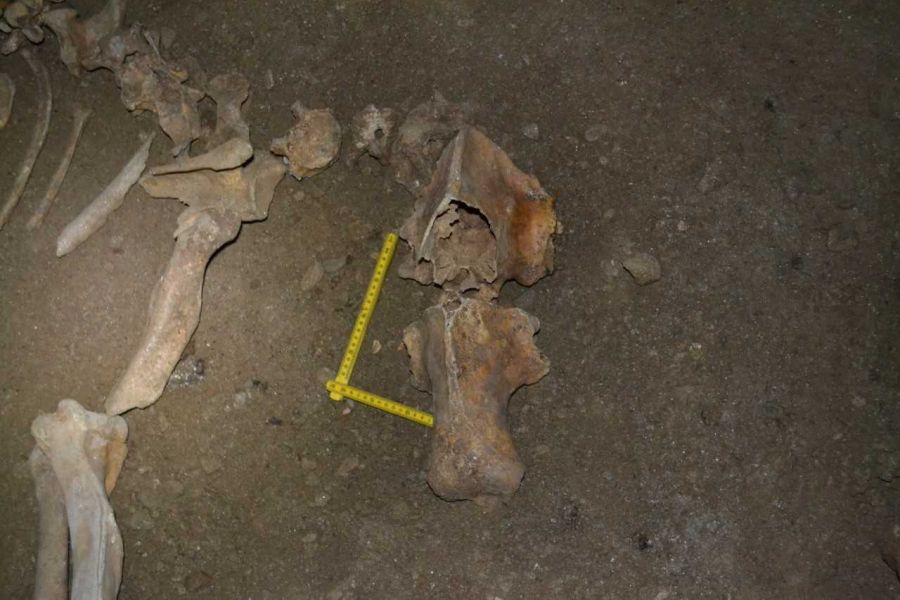News
12.05.2020
Cave Bear: A Vegetarian Carnivore
Scientists provide evidence of an exclusively vegetarian diet in the extinct European cave bear
Together with an international team, scientists of the Senckenberg Center for Human Evolution and Palaeoenvironment at the University of Tübingen found evidence that the extinct European cave bear had an exclusively vegetarian diet. Previous research suggested that these large bears in modern-day Romania partly subsisted on meat and fish as well. In their study, recently published in the nature journal “Scientific Reports,” the team of researchers was able to refute this assumption with the aid of a new analytical method.
Cave bears (Ursus spelaeus) occurred in Europe during the last glacial period, from about 100,000 to 25,000 years ago. With a length of up to 3.5 meters and a shoulder height of 1.7 meters, these widespread denizens of Europe clearly surpassed their modern relative, the brown bear, in size. “Therefore, it comes as an even bigger surprise that these animals – despite their size and the fact they lived in a cold and dry environment – exclusively subsisted on plants” explains Prof. Dr. Hervé Bocherens of the Senckenberg Center for Human Evolution and Palaeoenvironment at the University of Tübingen, and he continues, “While this vegetarian lifestyle has already been proven for the vast majority of cave bears in Europe, fossil discoveries from Romania gave rise to a lively scientific discussion as to whether cave bears in that region may also have fed on meat.” Nitrogen isotope values measured in the Romanian cave bears’ bone collagen resembled those of certain carnivores as well as strictly vegetarian animals such as the mammoths, making the interpretation of their diet controversial.
To solve this enigma, Bocherens – in conjunction with Dr. Yuichi Naito of the Nagoya University Museum in Japan, Dr. Ioana Meleg of the Emil Racoviță Institute of Speleology at the Romanian Academy, and an international team – examined specimens from three different fossil sites in Romania. “We measured special amino acids in the fossils’ bone collagen and subsequently compared the values with those from other cave bear bones as well as typical carnivores and herbivores; in our case, a lion and a horse,” adds the biogeologist from Tübingen to explain the new method he used.
The results obtained by the international team show that the cave bears in Romania also subsisted on an exclusively vegetarian diet before they became extinct about 25,000 years ago. According to the study, the new insights into the feeding habits of the extinct bears may also influence modern conservation concepts. “If we gain a better understanding of the reasons that led to the vegetarian cave bears’ extinction, we will be able to better predict how climate change may affect modern-day ‘vegetarians’ such as the giant panda or the binturong, and implement appropriate measures,” adds Bocherens in closing.
Publication
Naito, Y.I., Meleg, I.N., Robu, M. et al. Heavy reliance on plants for Romanian cave bears evidenced by amino acid nitrogen isotope analysis. Sci Rep 10, 6612 (2020). https://doi.org/10.1038/s41598-020-62990-0
Contact
Prof. Dr. Hervé Bocherens
Senckenberg Center for Human Evolution and Palaeo-environment (HEP)
Eberhard Karls University Tübingen
Phone 07071- 29-76988
herve.bocherensspam prevention@uni-tuebingen.de
Contact for press:
Eberhard Karls Universität Tübingen
Public Relations Department
Dr. Karl Guido Rijkhoek
Director
Antje Karbe
Press Officer
Phone +49 7071 29-76789
Fax +49 7071 29-5566
antje.karbespam prevention@uni-tuebingen.de
www.uni-tuebingen.de/en/university/news-and-publications
Senckenberg Gesellschaft für Naturforschung
Communications
Dr. Sören Dürr
Head of Communications
Judith Jördens
Press Office
Senckenberg Gesellschaft für Naturforschung
Phone 069- 7542 1434
pressestellespam prevention@senckenberg.de

